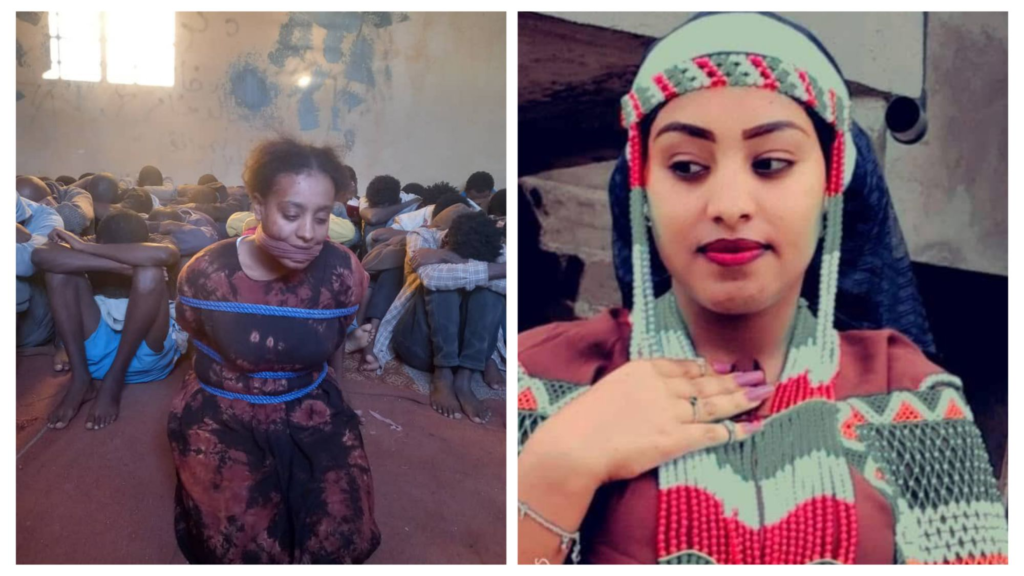In the heart of the 21st century, the echoes of humanity’s darkest chapters reverberate through the deserts of Libya. The town of Kufra, nestled in Country’s southeastern region, has become a grim epicenter of a modern-day slave trade targeting vulnerable African migrants and refugees.
Reports have emerged detailing the horrifying plight of dozens of individuals who are kidnapped, tortured, and sold for ransom, painting a harrowing picture of inhumanity that defies the progress of time.
A 21st Century Nightmare: Modern Slavery in Libya
Naima Jamal, a 20-year-old Ethiopian woman, stands as a stark example of this tragedy. Hailing from Oromia, Ethiopia, Naima arrived in Libya in May 2024, seeking a better future. Instead, her journey turned into a nightmare.
Captured by human traffickers shortly after her arrival, Naima’s family has since been bombarded with horrifying threats and videos of her being tortured, all while traffickers escalate their ransom demands.
Such stories are not isolated incidents. Kufra, along with other trafficking hubs in Africa, operates as a lawless zone where human lives are reduced to commodities.
Read : Libya: The Hidden Gem of North Africa
Videos and images sent by traffickers to families reveal victims in appalling conditions—haggard, malnourished, and awaiting auction in a scene that mirrors the brutalities of an era thought to be long past.
The Mechanics of Modern Slavery
Libya’s trafficking networks are highly organized and operate with impunity. These networks exploit the vulnerabilities of migrants fleeing poverty, conflict, and political instability in sub-Saharan Africa.
Many embark on perilous journeys through Libya, lured by the hope of reaching Europe. However, upon crossing the Libyan border, they are often intercepted by traffickers who subject them to unimaginable abuse.
🔥🚨BREAKING: This disturbing video showing Naima Jamal, an Ethiopian woman currently being tortured held and auctioned as a slave in Libya is going viral.
— Dom Lucre | Breaker of Narratives (@dom_lucre) January 7, 2025
A report from Converseer says Naima Jamal was kidnapped in Libya, tortured, with a $6,000 ransom for her freedom.
It… pic.twitter.com/Pqn9U6pIQE
The traffickers’ tactics include fraudulent recruitment, confiscation of identity documents, and debt-based coercion. Victims are forced into labor or sexual exploitation under constant threats of violence. Those unable to meet ransom demands are often sold to other trafficking networks or subjected to prolonged abuse.
An estimated 667,440 migrants currently reside in country, with over 43,000 registered as refugees and asylum-seekers. Many of these individuals are trapped in a cycle of exploitation and abuse, with state and non-state actors alike complicit in their suffering. The lack of government oversight, coupled with the fragile state of Libya’s political system, allows these crimes to persist unchecked.
The Libyan Coast Guard (LCG) has also been implicated in this cycle of exploitation. Reports suggest that elements of the LCG collaborate with traffickers, intercepting migrants at sea and returning them to detention centers in country where they face further exploitation. Financial incentives drive this cruel system, turning the Mediterranean crossing into a deadly gamble for migrants.
The Global Indifference to Human Suffering
The ongoing horrors in country highlight the indifference of the international community to the plight of African migrants. Activists like David Yambio, a survivor of trafficking networks, have condemned the complicity of global powers in perpetuating this crisis.
According to Yambio, the European Union’s migration policies have fueled the dehumanization of Black migrants in country, effectively outsourcing border control to a nation plagued by chaos and corruption.
“Libya is Europe’s shadow,” Yambio states. “It is a hell constructed by Arab racism and fueled by European indifference. They call it border control, but it is cruelty dressed in bureaucracy.”

The silence of the international community emboldens traffickers, who operate with near-total impunity. Despite the well-documented abuses, there has been little effort to hold the Libyan government accountable or to dismantle the trafficking networks that thrive within its borders. The result is a humanitarian crisis that leaves families devastated and victims trapped in an unending cycle of suffering.
For families like Naima Jamal’s, the financial and emotional toll is immeasurable. With traffickers demanding ransoms as high as $6,000, families often face insurmountable debts or must make impossible choices to secure their loved ones’ freedom. The psychological trauma of receiving videos of their relatives being tortured only compounds their suffering.
Breaking the Chains of Injustice
The persistence of modern slavery in Libya underscores the failure of global systems to address the root causes of migration and protect vulnerable populations.
Poverty, conflict, and political instability in sub-Saharan Africa drive many to risk their lives in search of better opportunities. Addressing these underlying issues requires coordinated international efforts and a commitment to justice that transcends political and economic interests.
Libya’s government must take responsibility for ending the trafficking networks that operate within its borders. Strengthening the rule of law, dismantling criminal organizations, and holding perpetrators accountable are critical steps in curbing the crisis.
However, the Libyan government cannot act alone. International organizations and nations with vested interests in the region must provide support and resources to combat human trafficking effectively.

Equally important is addressing the complicity of external actors. The European Union and other global powers must reconsider their migration policies, ensuring that they do not perpetuate human rights abuses.
This includes holding countries like Libya accountable for their treatment of migrants and refugees and providing safe and legal pathways for migration.
Activists like David Yambio remind the world of its moral obligation to act. “Justice must be more than a word spoken in comfortable rooms; it must be action that breaks chains and builds bridges,” he asserts.
Naima’s survival, and that of countless others, depends on whether the global community chooses to heed this call for justice or continues to turn a blind eye.
The harrowing tales emerging from Kufra, Libya, serve as a stark reminder of the inhumanity that persists in the modern era. For the victims of trafficking, their suffering is not just a personal tragedy but a reflection of systemic failures that devalue human lives.
Ending this crisis requires a collective effort to dismantle trafficking networks, address the root causes of migration, and uphold the dignity of all individuals.
As the world grapples with the uncomfortable truths of modern slavery, the question remains: will it rise to the challenge of justice, or will it allow the echoes of an ancient trade to continue reverberating through the sands of Libya?

